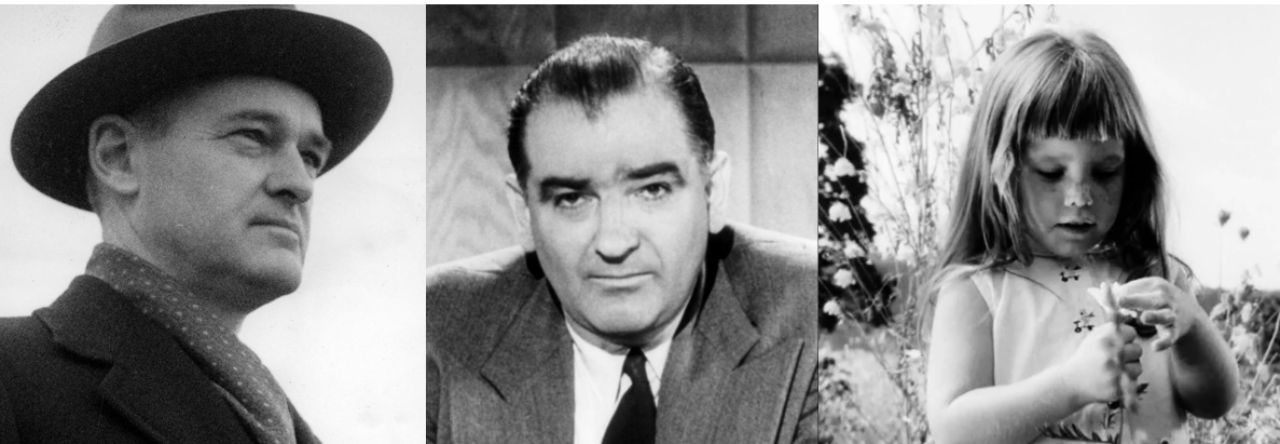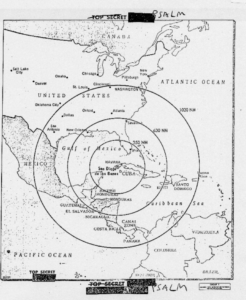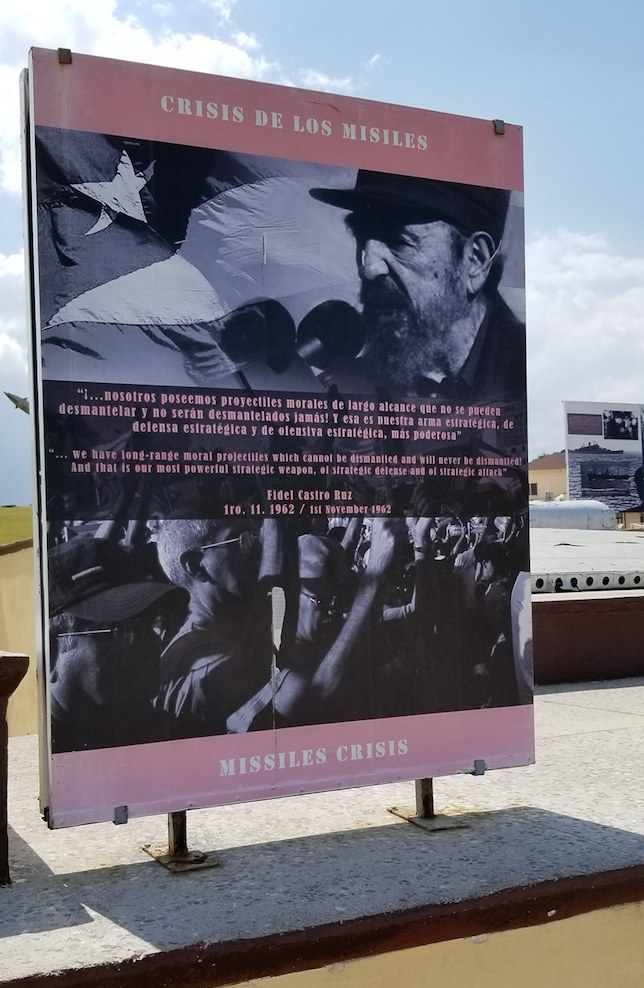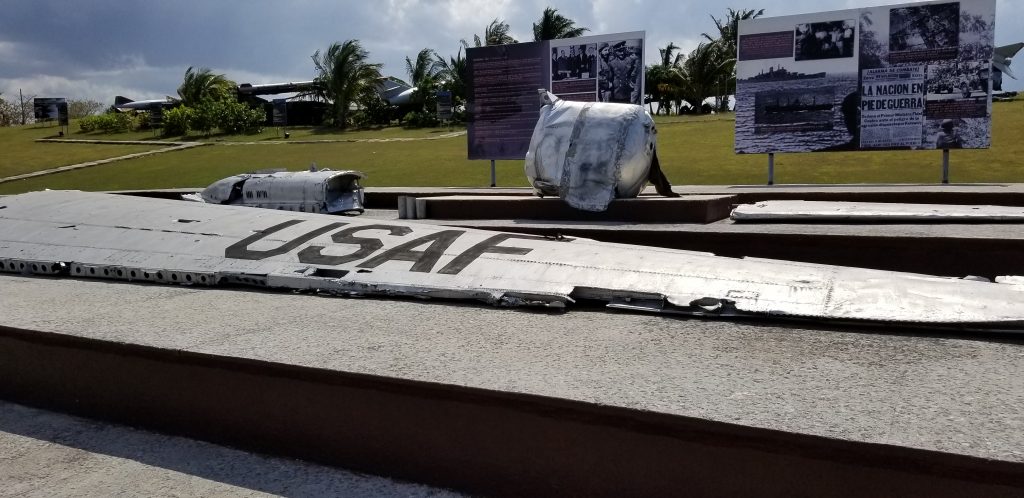This combination of unauthorized military and covert actions, misinterpreted military and political signals, and significant failures in intelligence—all of which threatened to set a war in motion—not only challenges earlier depictions of this event as a model of a “controlled crisis” but calls into question the fundamental assumption that severe international crises can, in fact, be “managed” at all. —Laurence Chang and Peter Kornbluh, GW National Security Archive
Timeline
- October 16: JFK briefed on U2 overflight discoveries in Cuba
- October 22: JFK goes public with TV broadcast, announces quarantine
- October 23: OAS endorses quarantine
- October 25: Adlai Stevenson confronts Soviets at UN Security Council
- October 26: Khrushchev writes letter // backchannel opens with ABC News
- October 27: Black Saturday
- U2 shot down
- Second tougher Khrushchev letter
- RFK meets with Soviet ambassador over secret Jupiter missile deal
- October 28: Khrushchev announces plans to withdraw missiles
Word cloud

Discussion Questions
- What were the key moments and turning points in the Cuban Missile Crisis?
- What insights should policymakers draw from this episode when preparing to face their own challenges in crisis management?
Transcript excerpts from initial EXCOMM meeting at White House (courtesy of Avalon Project at Yale via FRUS) (full audio below)
DATELINE: Tuesday, October 16, 1962,
[Following 7-1/2 pages of the transcript, which narrate the analysis of the U-2 photographs.]
JFK: Secretary Rusk?
Rusk: Yes. [Well?], Mr. President, this is a, of course, a [widely?] serious development. It’s one that we, all of us, had not really believed the Soviets could, uh, carry this far. Uh, they, uh, seemed to be denying that they were going to establish bases of their own [in the same?] [words unintelligible] with a Soviet base, thus making it [essential to or essentially?] Cuban point of view. The Cubans couldn’t [word unintelligible] with it anyhow, so. . . . Now, um, I do think we have to set in motion a chain of events that will eliminate this base. I don’t think we [can?] sit still. The questioning becomes whether we do it by sudden, unannounced strike of some sort, or we, uh, build up the crisis to the point where the other side has to consider very seriously about giving in, or, or even the Cubans themselves, uh, take some, take some action on this. The thing that I’m, of course, very conscious of is that there is no such thing, I think, as unilateral action by the United States. It’s so [eminently or heavily?] involved with 42 allies and confrontation in many places, that any action that we take, uh, will greatly increase the risks of direct action involving, uh, our other alliances and our other forces in other parts of the world. Um, so I think we, we have to think very hard about two major, uh, courses of action as alternatives. One is the quick strike. The point where we [make or think?], that is the, uh, overwhelming, overriding necessity to take all the risks that are involved doing that. I don’t think this in itself would require an invasion of Cuba. I think that with or without such an invasion, in other words if we make it clear that, uh, what we’re doing is eliminating this particular base or any other such base that is established. We ourselves are not moved to general war, we’re simply doing what we said we would do if they took certain action. Uh, or we’re going to decide that this is the time to eliminate the Cuban problem by actually eliminating the island.
The other would be, if we have a few days–from the military point of view, if we have the whole time–uh, then I would think that, uh, there would be another course of action, a combination of things that, uh, we might wish to consider. Um, first, uh, that we, uh, stimulate the OAS procedure immediately for prompt action to make it quite clear that the entire hemisphere considers that the Rio Pact has been violated [and actually?] what acts should [we take or be taken?] in, under the terms of the Rio Pact. The OAS could constitute itself an organ of consultation promptly, although maybe, it may take two or three days to get, uh, instructions from governments and things of that sort. The OAS could, I suppose, at any moment, uh, take action to insist to the Cubans that an OAS inspection, uh, team be permitted to come and, itself, look directly at these sites, provide assurance[s?] to the hemisphere. That will undoubtedly be turned down, but it will be another step in building up the, uh, building a position.
I think also that we ought to consider getting some word to Castro, perhaps through the Canadian ambassador in Havana or through, uh, his representative at the U.N. Uh, I think perhaps the Canadian ambassador would be the best, the better channel to get to Castro [apart?] privately and tell him that, uh, this is no longer support for Cuba, that Cuba is being victimized here, and that, uh, the Soviets are preparing Cuba for destruction or betrayal. You saw the Times story yesterday morning that high Soviet officials were saying, “We’ll trade Cuba for Berlin.” This ought to be brought to Castro’s attention….
[AUDIO FOR TRANSCRIPT BELOW]
McNamara: Mr. President, there are a number of unknowns in this situation I want to comment upon, and, in relation to them, I would like to outline very briefly some possible military alternatives and ask General Taylor to expand upon them.
But before commenting on either the unknowns or outlining some military alternatives, there are two propositions I would suggest that we ought to accept as, uh, foundations for our further thinking. My first is that if we are to conduct an air strike against these installations, or against any part of Cuba, we must agree now that we will schedule that prior to the time these missile sites become operational. I’m not prepared to say when that will be, but I think it is extremely important that our talk and our discussion be founded on this premise: that any air strike will be planned to take place prior to the time they become operational. Because, if they become operational before the air strike, I do not believe we can state we can knock them out before they can be launched; and if they’re launched there is almost certain to be, uh, chaos in part of the east coast or the area, uh, in a radius of six hundred to a thousand miles from Cuba….
Taylor: Uh, we’re impressed, Mr. President, with the great importance of getting a, a strike with all the benefit of surprise, uh, which would mean ideally that we would have all the missiles that are in Cuba above ground where we can take them out. Uh, that, that desire runs counter to the strong point the Secretary made if the other optimum would be to get every missile before it could, becomes operational. Uh, practically, I think the, our knowledge of the timing of the readiness is going to be so, so, uh, difficult that we’ll never have the, the exact permanent, uh, the perfect timing. What we’d like to do is to look at this new photography, I think–and take any additional–and try to get the, the layout of the targets in as near an optimum, uh, position as possible, and then take ’em out without any warning whatsoever. That does not preclude, I don’t think, Mr. Secretary, some of the things you’ve been talking about. It’s a little hard to say in terms of time how much I’m discussing. But we must do a good job the first time we go in there, uh, pushing a 100 percent just as far, as closely as we can with our, with our strike. I’m having all the responsible planners in this afternoon, Mr. President, at four o’clock, to talk this out with ’em and get their best judgment….
JFK: What is the, uh, advant- . . . . Must be some major reason for the Russians to, uh, set this up as a . . . . Must be that they’re not satisfied with their ICBMs. What’d be the reason that they would, uh . . . .
Taylor: What it’d give ’em is primary, it makes the launching base, uh, for short range missiles against the United States to supplement their rather [deceptive?] ICBM system, for example. There’s one reason…
Rusk: Still, about why the Soviets are doing this, um, Mr. McCone suggested some weeks ago that one thing Mr. Khrushchev may have in mind is that, uh, uh, he knows that we have a substantial nuclear superiority, but he also knows that we don’t really live under fear of his nuclear weapons to the extent that, uh, he has to live under fear of ours. Also we have nuclear weapons nearby, in Turkey and places like that. Um.
JFK: How many weapons do we have in Turkey?
Taylor?: We have Jupiter missiles . . .
Bundy?: Yeah. We have how many?
McNamara?: About fifteen, I believe it is.
Bundy?: I think that’s right. I think that’s right…
Rusk: Um, and that Mr. McCone expresses the view that Khrushchev may feel that it’s important for us to learn about living under medium-range missiles, and he’s doing that to sort of balance that, uh, that political, psychological [plank?]. I think also that, uh, Berlin is, uh, very much involved in this. Um, for the first time, I’m beginning really to wonder whether maybe Mr. Khrushchev is entirely rational about Berlin. We’ve [hardly?] talked about his obsession with it. And I think we have to, uh, keep our eye on that element. But, uh, they may be thinking that they can either bargain Berlin and Cuba against each other, or that they could provoke us into a kind of action in Cuba which would give an umbrella for them to take action with respect to Berlin. In other words like the Suez-Hungary combination. If they could provoke us into taking the first overt action, then the world would be confused and they would have, uh, what they would consider to be justification for making a move somewhere else. But, uh, I must say I don’t really see the rationality of, uh, the Soviets pushing it this far unless they grossly misunderstand the importance of Cuba to this country.
“Thirteen Days” (2001)
In one of the great counterfactuals of history, we might ask, What if Khrushchev had only held out another day or two for a public Turkey-Cuba trade? Without the “Russians blinked” version of history, might the American officials who planned the Vietnam War have had less faith in their calibrated brinkmanship? Might Khrushchev have survived the October 1964 coup plot, in which his adventurism in Cuba was one of the indictments? President Kennedy later estimated the odds of nuclear war during the missile crisis as having been one in three. Bundy guessed lower, at one in 100. But as Bundy added, “In this apocalyptic matter the risk can be very small indeed and still much too large for comfort.” —Thomas Blanton, GW National Security Archive



